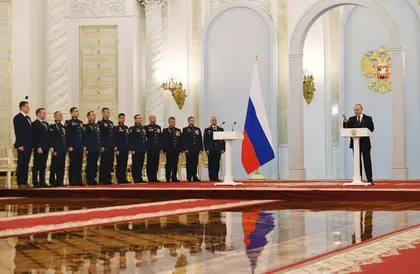Given the Kremlin truly believed its “special military operation” would result in outright victory in a matter of days, with a rapturous reception on the streets of Kyiv, it is perhaps no surprise that, nearly 10 months later, Russia’s capability to sustain such a protracted invasion is proving sorely inadequate.
They’re not having a great time, are they?
JOIN US ON TELEGRAM
Follow our coverage of the war on the @Kyivpost_official.
Absolutely not. Dogged Ukrainian resistance and support from their western allies means Russia’s war has been a series of humiliating series of setbacks and defeats, most recently from Kherson, a city that Russian President Vladimir Putin had “annexed” just six weeks earlier.
Ouch. What’s their latest issue?
Unreliable ammo, according to a senior U.S. official. Speaking on Monday evening, the U.S. said Russia is likely turning to older, less reliable artillery and rocket ammunition, as its newer stocks run low.
Indeed, Moscow's supply of modern ammunition is "rapidly dwindling" and would likely only last until early 2023 if its forces continue to fire at current rates, the official told journalists.
This "is probably forcing them to increasingly use ammunition in what we would consider degraded conditions," the official said.
"In other words, you load the ammunition and you cross your fingers and hope it's going to fire, or when it lands that it's going to explode."

Putin Hints Precondition for Peace Talks: Neutered Ukraine
That’s good news for Ukraine, right?
Yes and no. Yes, in that it offers yet more proof of just how badly things are going for Russia, but according to President Zelensky, they still have the upper hand.
Speaking to the G7 group of countries on Monday, he asked for more "modern tanks" as well as "rocket artillery and more long-range missiles," adding: "Russia still has the advantage in artillery and missiles."
"This is a fact. These capabilities of the occupying army are the ones to fuel the Kremlin's arrogance".
How important is artillery?
Massively for both sides and the numbers of shells being fired is absolutely staggering.
A senior NATO official said that last summer in the Donbas region, the Ukrainians were firing 6,000 to 7,000 artillery rounds each day, whereas the Russians were firing 40,000 to 50,000 rounds per day.
For comparison, NATO forces in Afghanistan might have fired 300 rounds a day.
How quickly can these be replaced?
Ukraine relies upon resupply from its western allies but the U.S. for example produces only 15,000 rounds each month.
On Friday, the White House announced a new $275 million aid package to help boost Ukraine's air defenses, against Russian drones in particular, AFP reports.
White House national security spokesman John Kirby said the aid "will soon be on its way to provide Ukraine with new capabilities to boost its air defenses and counter the threats that Ukraine is facing from drones."
The Pentagon released further details of the package, saying it includes counter-drone equipment, as well as ammunition for HIMARS precision rocket systems, 80,000 155mm artillery rounds, some 150 generators, and other equipment.
What’s Russia doing about its ammo problems?
Well, aside from digging into old and unreliable stocks, the Kremlin appears to be becoming more and more reliant on Iran.
While not supplying artillery, there are signs the two countries are developing an extensive relationship involving equipment such as helicopters and fighter jets, as well as drones.
These “kamikaze drones” are causing extensive damage in strikes against Ukraine’s energy infrastructure, last week plunging the city of Odesa into darkness.
The U.S. on Friday expressed alarm over a "full-scale defense partnership" between Moscow and Tehran, adding: “We have also seen reports that Moscow and Tehran are considering the establishment of a joint production line for lethal drones in Russia.”
The U.S. also believes that Iran is considering the sale of "hundreds of ballistic missiles" to Russia.
What has Russia said about this?
Moscow's UN envoy Vassily Nebenzia pushed back later in the day, telling a Security Council meeting that "the military industrial complex in Russia can work perfectly fine and doesn't need anyone's assistance."
The drone allegations, he said, were "already refuted" multiple times before.
So, it’s true then?
Given the Kremlin’s shaky relationship with the truth, that’s probably a safe bet.
You can also highlight the text and press Ctrl + Enter










